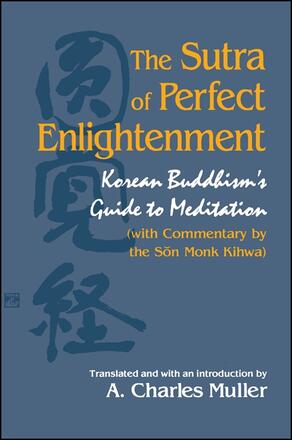
The Sūtra of Perfect Enlightenment
Korean Buddhism's Guide to Meditation (with Commentary by the Sǒn Monk Kihwa)
Alternative formats available from:
A concise guide to the key practice systems of the East Asian Meditational schools Ch'an, Son, and Zen.
Description
The Sūtra of Perfect Enlightenment, used in monastic education for more than a millennium, is a concise guide to the key paradigms of the practice systems of the East Asian meditational schools (Ch'an, Sǒn, and Zen). Contained in its twelve chapters are definitive explanations of the meaning of innate and actualized enlightenment, sudden and gradual enlightenment, the true nature of ignorance and suffering, along with numerous examples of methods of contemplation that accord with and reflect the basic Ch'an views on enlightenment and practice. Although the Sutra was popular throughout the East Asian region, it attained its highest canonical status within the Korean Chogye school, where it is still a key text in the core curriculum of modern-day monks and nuns. The Sutra is translated here in full, along with the eloquent and revelatory commentary of the Chǒson monk Kihwa (1376–1433).
A. Charles Muller is Professor of East Asian Philosophy and Religion at Toyo Gakuen University, Japan.
Reviews
"One of the most attractive aspects of this work is simply that it is a well-done translation of an important text. Considering that the Sutra of Perfect Enlightenment is also of great importance in China and Korea, it is particularly welcome that Muller, one of a handful of recognized scholars of Korean Buddhism, has chosen to translate it. The Introduction provides an excellent overview of major issues in East Asian Buddhist thought, and Muller's ability to contextualize these issues in terms of both indigenous Chinese intellectual traditions as well as their Korean trajectories provides a healthy and rare alternative to the more typically narrow treatments of particular texts." — Jamie Hubbard, Smith College
"What I like most about this book is its intercultural approach to the study of a Buddhist internal problem, and its lucid and accessible prose style. This book adds one nail to the coffin of interpretations of Zen that continue to portray it as an anti-intellectual, doctrineless protest against clear and rational thinking and analysis. It is a superb example of historical reconstruction in the fields of Buddhist studies and Korean religious studies, worthy of emulation." — John Goulde, Sweet Briar College